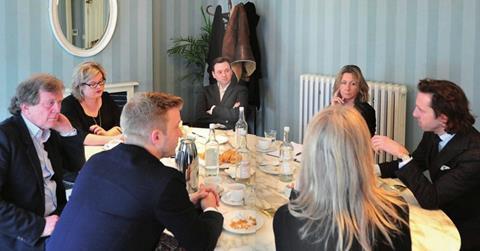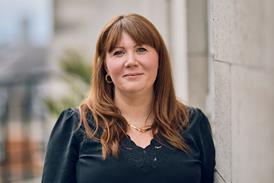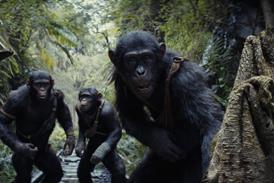Agents have an increasingly important role in the film and TV industries. At a Screen-hosted roundtable, Wendy Mitchell and Andreas Wiseman asked some of the UK’s key players how agenting is changing.

Expert panel
Charles Collier, Tavistock Wood
(Alicia Vikander, Olga Kurylenko, Ronan Bennett)
Duncan Heath, Independent
(Steve Coogan, Matthew Vaughn, Mike Newell)
Sarah Spear, Curtis Brown
(Robert Pattinson, Dev Patel, Tom Sturridge)
Josh Varney, 42
(Lynne Ramsay, Terry Gilliam, William Monahan)
Jane Villiers, Sayle Screen
(Yorgos Lanthimos, Andrea Arnold, Clio Barnard)
What has been the biggest change since you started in the business?
Charles Collier There are two clear things that have changed since I came into the business. Firstly, as agents we have to be operating under the UK system and UK laws and, at the same time, we have to be familiar with and confident at working in the US system. Secondly, every career that we look after should have a variety and balance between film and TV to reach its potential. As agents, we have to be comfortable in both worlds and both in the US and UK. The generation before ours let the US agent do what they wanted.
Josh Varney What I’ve seen change in the last five years is the volume of information-sharing. In the UK we are now getting the same information at the same time as our US counterparts… A real strength of being in London is that one can sometimes be ahead of the game compared to American agencies. When I started, that wasn’t the case. It was always that the UK film-maker would make their first film here and would then be desperate to forward their career by moving to Los Angeles. They no longer think that’s the gold standard.
Jane Villiers The studios themselves have changed. There is now such a huge division between independent films and what the studios are doing; they’re not working with clients in the way that they used to. We used to use US agents to find out what was going on in the studios but that is not as important now.
How closely do you work with your clients’ US agents?
Collier We have American agents who we have intensely close relationships with. When a career gets to a certain size, you just can’t work 24 hours a day.
Sarah Spear I think it’s very different on the acting side to the lit side. There seems to be a very different relationship. On the acting side, it has paid off to bring on board someone who you really trust and we’ve never had our fingers burnt on that.
Varney One thing I’ve seen change is the reciprocation of talent. I’ve personally benefited from building really solid relationships with key agents [in the US] and as the world has gotten much smaller and the international business has got much more important, as a company we’re now representing American writers, actors and directors. We were able to leverage our relationships here in TV to put together international movies that would previously have been studio movies. We have benefitted from investing in those relationships really early on. That is in no way the rule, but is a real growth area for UK agencies.
Do you think the British talent pool has improved in the last 10 years?
Collier It’s the talent pool that has actually created the industry. Export is up 112% since 2001, largely because of the talent that draws people here. We’re talking about UK talent, the crews and the whole infrastructure. We didn’t have the studio system or mass direct public subsidy like the French, it had to come from the talent first. The sheer energy of the talent has built what I think is a really meaningful industry. Together with some recent very good government thinking like the tax credits on TV, there has been a huge boom again for our creative industries. UK writers are absolutely everywhere across high-end TV.
Varney American studios are making a great deal of their product out of our UK studios. The smart producers out there know that there’s no business in just being pigeonholed as a British producer making British product on the off chance it might travel. There’s a level of ambition that I didn’t feel when I started in the business. Talent is happy to stay here, live here and build here. Where the money comes from is less relevant than where the project happens.
Villiers We are in a very global industry and we all represent directors from Europe. When you think of someone like David Heyman and what he’s done here, it is fantastic.
How is international finance influencing the way you’re working globally?
Varney For me, in terms of television, sales and formats, you can get more money - TV not film - from international territories than you can by going to the States.
Collier I find there is much better access now to India in particular because there are good strong cultural links between our countries and there are big Indian investors. Likewise with Russia. What makes London unique in terms of financing projects is that we’re able to bring together US finance, but with European subsidy. We’ve got a good balance here. Our tax credit system means we do have public investment that I would always argue is essential to build a talent pool. We sit perfectly between the European subsidy model and the US.
Are packagers at the US agencies such as CAA, UTA and WME the gatekeepers now?
Duncan Heath I think the word package is a pretty overused word… Also it’s worth asking why there are basically three agencies in a much larger field in the US, but 500 agencies in London? There’s an interesting dilemma there… Why do we have so many small agencies here? If you look at TV packaging that’s just a points system. With film packaging, I think the power of the agencies is on the decline compared to the earlier days in my career. I know that any director or writer of mine who hears they’re part of a package would quite rightly scream and shout.
Varney Duncan’s question is a really important one. Why are there so many agencies in a small space? I think the UK is all about individual relationships with talent and the small agencies have a place to be able to give that personal attention to their talent… As a boutique start-up, there’s definitely a place for us amongst some incredibly sophisticated, long-standing agencies.
Spear I think we’re more comparable to managers in the States…When you have the conversation with the clients about why they would have a manager, what we do is we cover what a US manager would do anyway.
Heath The truth is that we have a tiny business. If you are totally honest, do you think that once your client is working primarily in the States you have the same relationship with them if 100% of their work is coming out of the American studios? A successful UK actor will at some point have a US lawyer, US agent and US manager. American agents are much more aggressive and it’s slightly stretching the truth to say that we always have a wonderful relationship with them.
Spear Skype is key. Certainly for actors, the huge difference is that in the past you had to go over to LA and spend your time over there. With the technology now, you don’t have to move over there, you can have people with successful studio careers but they can still be based here. The younger ones can audition and download on the same day, that’s completely different from five years ago and certainly 10 years ago. That’s keeping a lot of people here.
Varney There are many facets to being a representative in this climate. You need to be an agent protecting the talent. Secondly, you need to be a manager to build a career from its infancy to global standing and also you need to be entrepreneurial and find work for your client… When the American agencies are becoming more aggressive and coming after our clients early on, one has to be more than an agent in the US sense.
Is there a perception that UK agents aren’t aggressive enough in terms of getting clients and packaging?
Varney You’ve got to be careful with the word packaging. A package means something very specific: an agency putting together a film or TV project and charging what is essentially a producer’s fee for it. That’s fine and that does exist. In TV it’s a huge business, but in film, it’s less prevalent than it was 10 or 15 years ago. I feel if you’re doing the job of a smart agent over here, every day you are packaging your clients’ work. Whether you’re charging a fee for it is irrelevant… It’s what the best entrepreneurial agents are doing every day.
A lack of diversity both in front of and behind the camera remains a big problem in the UK. To what extent is this on your radar?
Collier Look at the stats, compared to every other sector in the UK you’ll find the creative industries as a whole steal a massive march on everything else. A lack of ethnic diversity is something we’re all committed to improving.
Varney TV commissioners and networks are making a concerted effort to rectify this. There’s been a real move to create more diversity.
Heath As agents, we answer to the marketplace. How much clout do we have in terms of changing that? My guess is very little. Agents are colour blind. It’s our nature to go for people who are really talented. I don’t think we go out of our way to fight in that battle. I think it’s just time. In 10 years time the issue will be irrelevant.
Collier Duncan’s right, in that you can only give the market what it wants, but there are times when you can tell them that they should think differently… Traditionally, London has been a good place for talent from an ethnic background to flourish on the international stage. I’m sure there’s more work to do.
Villiers If you look at where the talent is coming from in terms of ethnicity, it’s theatre and they really are colour blind, compared to TV, where the commissioners have been hugely responsible for not having enough diversity.
Varney It’s not just about on-screen talent. It’s also about people working in the industry, including agents. We’ve all been guilty of it. It’s much easier to work with or hire someone who is a friend of a friend or who has a particular background or a relative within the industry, than it is to take a chance on someone with none of those things. The majority of people who work within the agency environment are normally one removed from a family connection. That’s something I think we can all work harder to change. Michael Foster’s charity [Creative Access] which is all about taking those people who wouldn’t normally get the leg up into the industry through an intern scheme is a stroke of genius, and all of the agencies are either employing people from that initiative or intend to do so.
Spear We have a big intern scheme and two out of three of our most recently hired film and TV agents are from ethnic-minority backgrounds. That said, there’s much more we can do.
Heath There is a very serious point that drama schools are expensive and much more public-school driven. One of the things we should be doing as agents is ensuring that every agency is helping out people who can’t afford it.
Collier We should be fighting as a group like crazy to ensure the government recognises how essential those drama schools are.
Would more agency consolidation be helpful?
Collier If you’re a smart agent in a small agency or in a large agency, you should be able to extract the same information. What a big agency can sometimes do is cover up those agents who are not as entrepreneurial and not as forthright or willing to go out and get the information, because it provides a comfortable environment. There’s a small group of smart agencies that would survive in any climate - that 500 agencies figure is a bit misleading.
Varney If you look at CAA and WME, their ability is to leverage their relationship with talent and say, ‘I’ll sell your movie in the US.’ They take 10%-15% on a US sale at $8m; that’s rather nice for a small indie movie. There’s a huge potential growth side to that for the agency in the UK that gets that kind of scale… Where the American agencies have been brilliant is having the different divisions serve the mothership, but one has to be careful of taking your eye away from the core business of being a good representative.
Is there the space for independent agencies to grow in the UK?
Heath You can grow as much as you like. What we’re all guilty of as agents is hoping the business will look after us. Wakey wakey, it won’t. The difference between when I started and the business now, is that if you’re going to survive, you have to be much more entrepreneurial. There are so many more players. It used to be much simpler… you’re going to have to understand much more about the business than just saying, ‘Hello, any casting?’ You have to know about hundreds of things.
Collier We have to be very sharp because now we’re dealing with a world in which the right career is spread across theatre, film and high-end TV. We’re seeing the boundaries start to disappear… The VoD market is booming and we’re seeing players like Netflix and Amazon enter the market. We need to be strategically very sophisticated about the work we do.
Heath With all the talent we’ve got, why don’t we have the equivalent of an American studio in the UK? We often have to go out of the UK to set up a British film as we only get dribs and drabs in investment. We don’t have the same as France. All our studios are primarily servicing studios. Why don’t we have a one-stop shop? It would be nice to think there was someone you could go to in London; that we could just do the deal here.
What is the biggest challenge facing you in the next five years?
Varney It’s making sure that you remain relevant in a business that is changing daily in terms of digital distribution platforms, and retaining entrepreneurial relationships with your clients.
Villiers It’s a knowledge of what is happening because the marketplace is changing on a daily basis, particularly in TV. I think the other challenge in terms of TV is the role of the broadcaster, which I think will be diminishing over the next few years. We will not be getting the deals we used to get and could rely on. We have to understand where we’re going to get the money and who the players are going to be. In a sense, it’s the same with film.
Collier To grow the creative roots in London, which I think is the best place in the world to have them. To retain intensely personal relationships and at the same time be outward looking towards an entire global market and be able to adapt and change as that market does and at an increasing speed. It’s that balance between the personal and a sophisticated business model.
Heath You’ve got to understand finance and be wary and aware that unless you are incredibly bright, you’ll be swallowed by the American agencies. You should probably have offices in Europe and Australia and not rely totally on what happens here in the UK.
Spear It’s a balance of being personal to clients but absolutely keeping ahead of where the industry is.

























1 Readers' comment